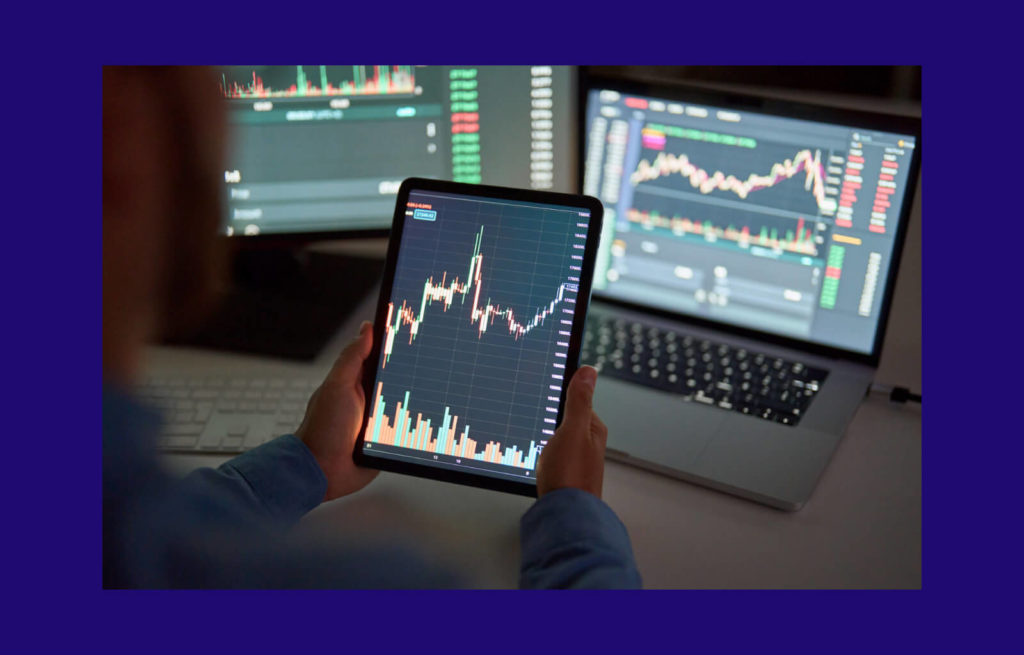AI in HR tech – Explore key trends shaping the HR sector
The great popularity of artificial intelligence in recent years has translated into the rapid development and frequent implementation of AI-based tools in many business fields, including HR. Many companies are looking for ways to best utilise both AI and generative AI solutions in HR tech. Given this, together with our experts, Jaroslav Jurkoit – HR Tech Business Analyst and Tomasz Smolarczyk – Head of AI, we have prepared an overview of the most important trends related to AI in HR. In this article, we delve into the transformative potential of artificial intelligence in HR tech, presenting the results of various studies that show the most attractive opportunities and benefits associated with leveraging AI solutions.
The current state of AI in HR tech
The HR industry is one of the sectors where various types of solutions based on AI or powered by ML, NLP and other automation features have been in service for many years. Early adoptions of these technologies appeared in tools such as resume screening software, applicant tracking apps or talent acquisition solutions. Today, with accelerating tech development and increased investments in artificial intelligence, there are more and more opportunities and features for which this technology can be employed.
According to the Eightfold AI survey from September 2023, HR leaders recognise that AI could have the greatest impact on their industry in areas such as recruitment and talent acquisition, employee onboarding and training, employee engagement, performance management and feedback, and compensation and benefits management. More so, nearly 70% of these HR professionals say they are excited or optimistic about AI in HR, and almost 40% of them are already using such solutions to some extent.
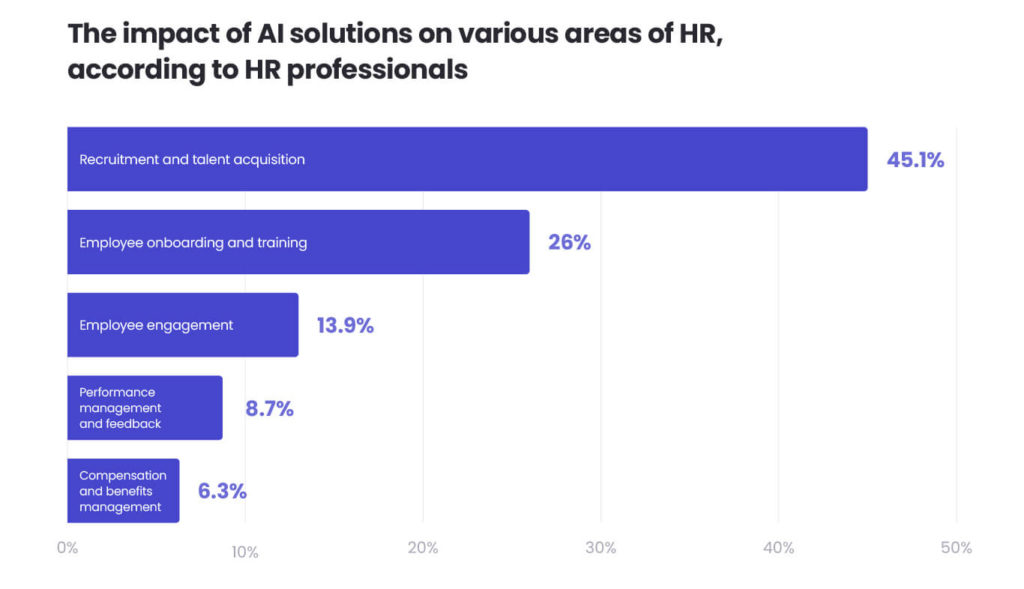
source: Eightfold AI: Designing the future of HR with AI
In turn, sources such as Stanton Chase and Gartner report consecutively that up to 66% of CEOs believe that their HR departments can benefit from using artificial intelligence and that 81% of HR leaders have explored or implemented AI solutions to enhance the efficiency of their company’s processes. In terms of what these solutions will be used for, their reports suggest that 52% of HR leaders intend to use AI to improve the employee experience, 37% of HR professionals aim to use it to reduce costs, and 28% of HR experts will use it to support learning and development (L&D) activities.
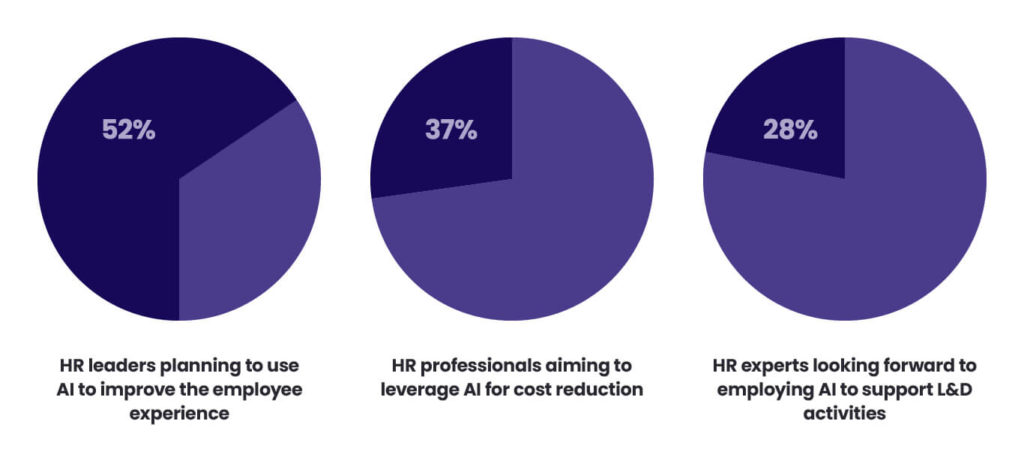
source: AI in HR: How AI is transforming the future of HR
Moreover, despite the already high popularity and adoption of AI, The McKinsey Global Institute estimates that nearly 50% of work and daily tasks can still be automated with current technologies and limited process changes. With that in mind, below, we take a closer look at various trends and areas where there is the potential to develop applications of AI tools in HR.
How AI innovations impact the HR sector
When it comes to the HR sector, it is essential to remember that it usually plays a significant supporting role in organisations and can deal with a large number of tasks and issues. From recruiting and hiring through onboarding, benefits aspects and L&D (learning and development) to payroll, performance management or ensuring the effectiveness of diversity, equity, inclusion, and belonging (DEIB) programs. Adding to the multiplicity and complexity of these matters, there are also the challenges related to a competitive and often global job market, high levels of turnover, stress or burnout among employees, or the increasing need for rapid development or re-training of employees.
With all these challenges in mind, it’s no surprise that the HR sector is eager to implement all sorts of solutions, technologies or functionalities that make tasks simpler and faster. The use of AI technologies allows for more efficient human resource management and decision-making based on data analysis, machine learning or automation. All of that can contribute to reducing workloads, saving time, increasing operational efficiency and providing better quality outcomes. In addition, automation of repetitive tasks and freeing up some of the employees’ time allow HR departments to focus more on strategic activities that can translate into business results.
Importantly, properly used AI tools for HR can also provide relevant information, insights or recommendations in near real-time. Thus, influencing the experience of both HR employees and job-seekers. Efficient use of these features can significantly improve the employee experience, therefore increasing the level of motivation and satisfaction among the entire staff.
Early integration of artificial intelligence into HR tech systems can strengthen the position of HR departments and entire companies in a competitive market. Emerging AI novelties are quickly moving beyond mere productivity enhancements and process optimisations. Instead, they are transforming into drivers of innovation, allowing HR professionals to focus more on strategic planning, all while maintaining the personal interactions and human elements that are fundamental in human resources.
Jaroslav Jurkoit, HR Tech Business Analyst at Spyrosoft
The boom on generative AI
Speaking of the rapid development of AI technologies and the increasing potential for their application in HR, it is impossible not to mention generative AI (Gen AI). The use of this tech in products such as ChatGPT, Gemini, GitHub Copilot or Stable Diffusion has significantly contributed to its global popularisation. They have shown that essentially anyone can use it. These types of applications are easily available and can perform a wide range of routine and repetitive tasks, such as collecting, reorganising and classifying data, summarising multiple data sets or processing large amounts of information. In addition, by training on a huge amount of existing data, these models also allow the creation of new outputs, such as generated texts, images, sounds, or videos.
In the HR sector, AI integration means more than just a technological upgrade; it’s a strategic must-have. Generative AI is also playing an increasingly important role, allowing not only to speed up and automate routine tasks, but also to increase analytical depth and operational efficiency. HR departments can successfully use this technology to improve decision-making processes and enhance the employee experience. The AI-related shift is less about replacing human roles and more about enhancing human capabilities, enabling HR professionals to focus on strategic initiatives. We see artificial intelligence as a key factor in the future of HR, with the potential to redefine how the industry operates.
Tomasz Smolarczyk, Head of AI at Spyrosoft
According to Gartner’s 2023 report, 52% of companies were interested in the use and opportunities associated with generative AI. That may indicate the great potential of this technology and the growing awareness of its possibilities and the benefits that go with it, such as time savings and productivity gains.
For instance, Boston Consulting Group predicts that AI strategy and Gen AI have the potential to boost productivity by up to 30% across the HR value chain in the near future. What’s more, their report also states that current Gen AI use cases show a triple increase in speed when creating and visualising HR content, as well as highlights the automation capabilities for more than 50% of onboarding tasks.

By leveraging advanced natural language processing and machine learning capabilities, generative AI in HR can easily be used for writing job descriptions, scouting, screening and pre-selecting resumes, analysing qualitative HR data, processing documents, supporting onboarding, or responding to employee inquiries, for example, via a chatbot.
All platforms, functionalities or chatbots based on generative artificial intelligence can revolutionise the candidate and employee experience, e.g., by providing real-time responses and assistance. What is more, it is evident that the boom in generative AI is fostering a more efficient, data-driven, and user-friendly HR tech environment, ultimately reshaping how organisations attract, assess, and retain talent.
Trends of AI application in HR
To take a cross-sectional look at AI trends in HR, we conducted a desk research study that analysed the activities and solutions provided by HR tech companies. The analysis covered 287 firms engaged in creating innovative tools, apps, and features for the HR industry. These organisations were mainly startups and smaller companies (1-50 employees) sharing revenue information ($1 MM to $500 MM). Observing trends in these companies allowed us to forecast which features have the greatest potential, both now and in the future. This research allowed us to distinguish four dominant areas for using solutions and tools that employ AI for HR.
Recruiting
The first prominent HR area that often applies AI solutions is recruiting. This comes as no surprise, especially since the hiring field was one of the first to start using artificial intelligence to streamline processes. Today, these solutions are implemented at almost every stage of the recruiting journey – from the initial screening of candidates to their induction into the company and onboarding. Our market analysis shows that among the most common solutions and functionalities using AI in this area are:
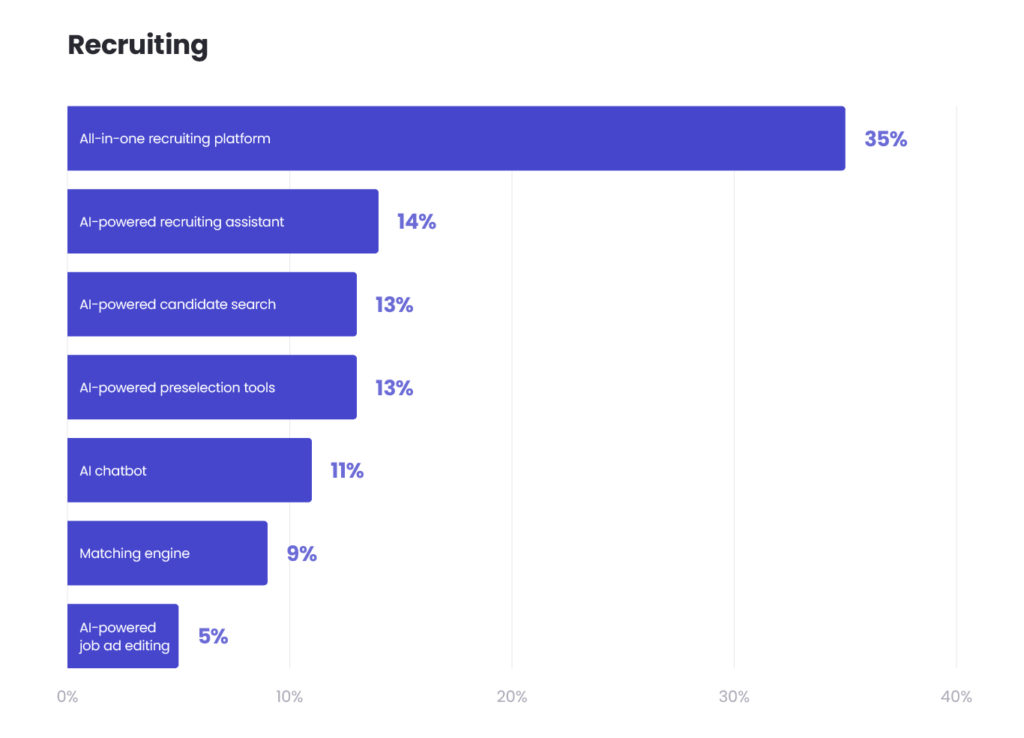
All-in-one recruiting platform (35%) – One of the most popular approaches companies take regarding HR tech solutions is to develop their own recruitment management platform from scratch. Typically, these are various types of ATS (Applicant Tracking System) systems supplemented with AI functions for pre-selection of applications, job offers editing in line with equal chances and non-discrimination policies, tracking recruitment progress or creating personalised communication on a large scale.
AI-powered recruiting assistant (14%) – The second defined group of solutions focuses exclusively on designing bespoke AI assistants for companies’ internal needs. In terms of features, these tools are very similar to the group mentioned above. The main difference is that, in this case, the offered solutions are customised rather than being off-the-shelf ATS platforms.
AI-powered candidate search (13%) – Other popular options from the HR tech sector are tools that use AI to search for suitable candidates on various online platforms. These types of solutions help to speed up the talent search process while assisting in finding candidates who better match the requirements of recruiters.
AI-powered preselection tools (13%) – The next identified group of tools focuses on the pre-selection of candidates. These solutions, thanks to the use of AI for data analysis, simply preselect the applications and assess both the technical and soft skills of candidates even before the first recruitment interview.
AI chatbot (11%) – Other frequently applied tools are AI-supported chatbots that perform various types of tasks. In the context of recruitment itself, they are most often used to automatically answer candidates’ questions or ask them natural-sounding questions. It’s worth mentioning that the use of chatbots goes beyond the area of recruitment itself, and also appears as a popular solution in other fields analysed below.
Matching engine (9%) – These types of solutions can help carefully match the individual skills and predispositions of candidates or employees with the requirements of specific positions and roles in the company. Thanks to artificial intelligence, matching engine tools can quickly process and analyse hundreds of thousands of data, both from candidate applications and job descriptions or requirements. As a result, they allow the automation of a large part of recruiters’ activities.
AI-powered job ad editing (5%) – A final distinctive group of recruitment solutions are specialised tools that support writing for specific job offers. They are based on specifically trained language models that facilitate the creation of tailored job descriptions and effective editing of job ads.
Data analysis
An important area in the HR sector that draws heavily on the potential of AI and ML tools is data analysis and processing. Many functions related to HR collect and process huge amounts of data, often including sensitive ones. AI-equipped solutions help draw conclusions, discover insights, identify patterns and make predictions that can benefit HR departments in many ways. In-depth analysis of such information allows HR professionals to make well-informed decisions and develop strategies that profit both employees and entire organisations. Key services and solutions that help work with big data include:
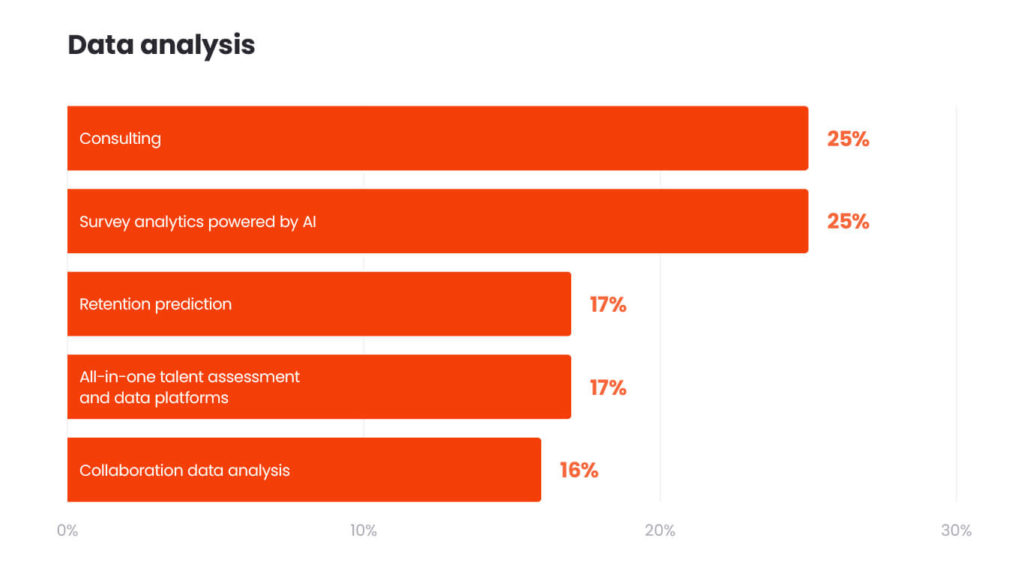
Consulting (25%) – When it comes to AI-based data analysis, consulting and advisory services seem to be a key aspect. In an era of rapidly emerging AI innovations (for which regulations often lag behind) and the processing of vast amounts of often sensitive data, many organisations may need additional knowledge and expert support. An experienced consultant or technology partner can help answer questions about what data a company can gather and process, for analysing what types of data AI tools can be used, or when a code of ethics for data usage should be created.
Survey analytics powered by AI (25%) – Equally popular in the HR tech market are AI solutions that analyse information acquired through various questionnaires, surveys and research. With them, firms can easily collect, review, and analyse data on the well-being and sentiment of employees, satisfaction with their career path and development so far, and many other issues relevant to the organisation. The use of AI solutions helps speed up the processes, enables more effective analysis of the collected data, and encourages further use of it to make the best possible business and managerial decisions.
Retention prediction (17%) – Another functionality for which AI is used is the prediction and analysis of rotation and turnover rates of employees. Based on the collected data, these tools allow firms to estimate the level of employee retention and facilitate the preparation and implementation of appropriate strategies that can help address market challenges and optimise the activities of the existing workforce.
All-in-one talent assessment and data platforms (17%) – The next frequently used data analytics solutions are platforms allowing for efficient employee assessment and effective talent management within the company. In these tools, AI solutions are often used to individualise employee career paths or learning directions. Appropriate use of such platforms allows maintaining a high level of staff satisfaction, which in turn often translates into their level of commitment to the job.
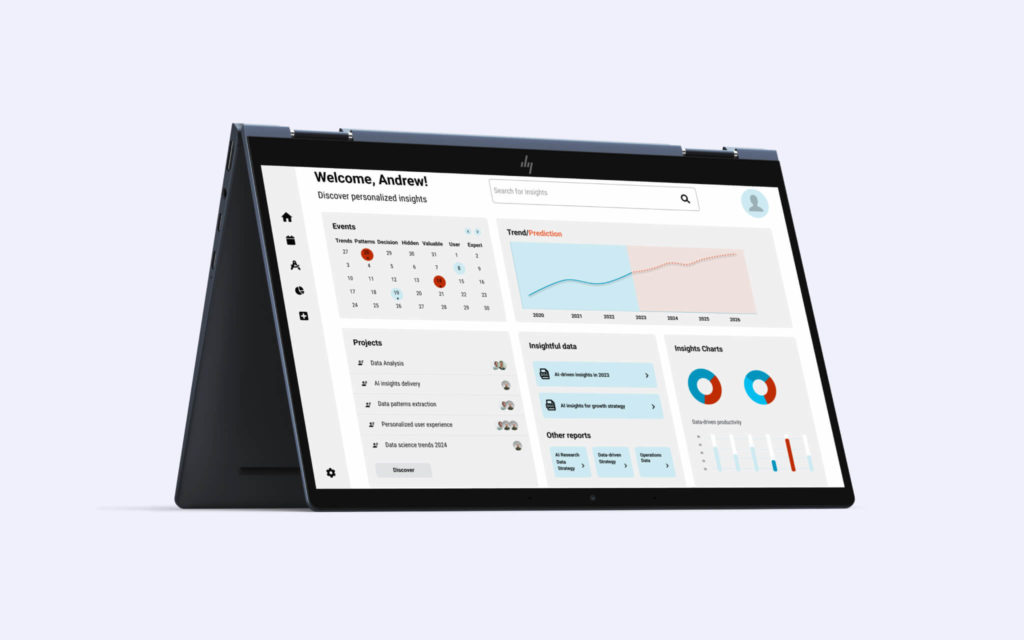
Collaboration data analysis (16%) – Another aspect that big data analytics is being used for is the field related to evaluating and facilitating collaboration among a company’s employees. By integrating with major operation tools and collecting metadata, AI can identify the best sources of knowledge for individual departments, monitor whether employees work well together, or appoint both formal and non-formal team leaders. All of this can make it easier to manage teams and support employee efficiency and engagement.
The future of HR lies in its ability to seamlessly integrate AI into its strategies and make data-driven decisions. It helps not just to understand who fits the role today, but who can grow with the role, the team, and the company in the future. The prediction abilities of artificial intelligence, which are based on various factors and historical metrics of a particular company, are incredible. With AI, we can provide strategic thinking on a completely different level.
Jaroslav Jurkoit, HR Tech Business Analyst at Spyrosoft
Performance management
Another area that has begun to gain even more popularity in late 2023 is performance management. According to the State of people strategy report from Lattice, employee performance and engagement are the biggest priorities among HR teams. This change may have been influenced by shifts in the job market caused by lay-offs at some large companies. This situation has lowered the focus on talent acquisition but increased the demand for tools supporting the management of employee performance, productivity, and efficiency. Our research shows that the most popular solutions that can help in this area are:
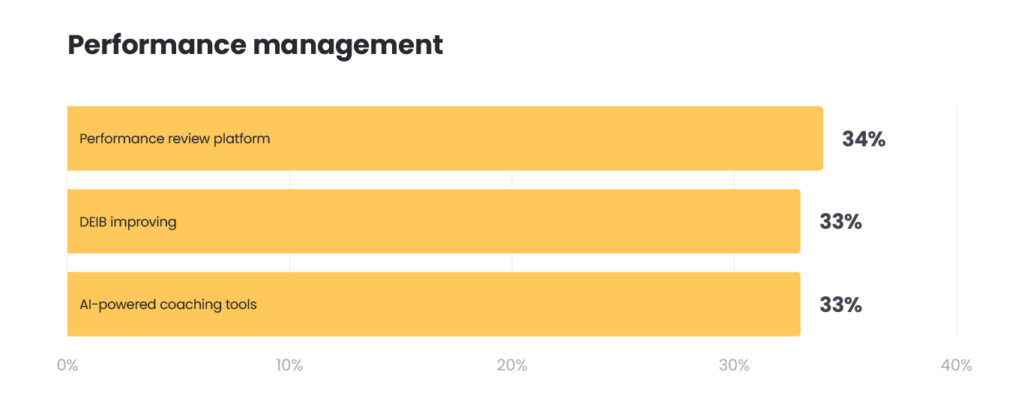
Performance review platform (34%) – One of the top solutions for HR that employ AI are platforms designed to help analyse employees’ activities and the level of fulfilment in meeting their goals or achieving performance. These solutions usually offer straightforward access to key metrics and performance data. Thanks to AI solutions, the efficiency of individual employees or entire departments can be easily assessed, analysed and managed directly from such platforms.
DEIB improving (33%) – Another essential aspect in the performance area is ensuring the effectiveness of diversity, equity, inclusion, and belonging (DEIB) programs. AI-based solutions can help identify signs of discrimination and inequality as well as support the implementation of an organisation’s strategy and culture that is inclusive, open, and aligned with employees’ values.
AI-powered coaching tools (33%) – The last large group of solutions utilising AI in the area of performance management are tools and platforms that assist in training employees and managers in various soft skills. These can address issues of transparent communication, giving and receiving feedback, or mediating and managing conflicts. The AI technologies used in these tools can suggest the best learning methods, customised training recommendations and personalised development paths, making it easier for employees to maximise their potential.
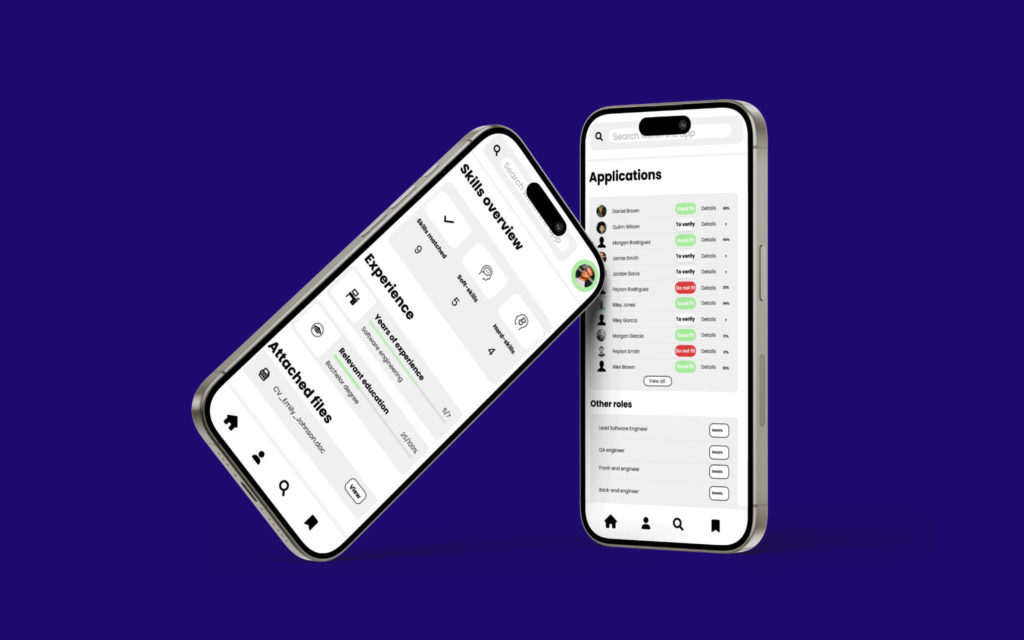
Talent engagement
The last highlighted HR area that benefits from AI solutions is talent engagement. Ensuring a good level of employee commitment and involvement has been a priority for HR teams for a long time. Leveraging AI tools to do so offers a quick and efficient way of collecting the insights needed to improve employee satisfaction and engagement. In our research, two types of popular solutions that can support HR departments in achieving these goals stand out in particular:

KPIs and feedback analysis (75%) – Popular tools in the talent engagement area often work similarly to those related to performance. They collect data from similar sources but focus on mutual feedback and the effectiveness of ongoing efforts. By using artificial intelligence, these tools can analyse KPIs and any feedback from team members, thereby obtaining valuable insights to provide greater employee recognition or early detection of turnover risks. On top of that, based on the analysis of feedback records and their content, these tools can determine elements of an employee’s work that may need improving in the future.
Feedback platform; feedback coach (25%) – The second type of noticeable AI-powered tools on the market are all kinds of platforms that aggregate evaluations and teach a feedback culture. These solutions both help to manage feedback and facilitate its analysis. Importantly, the latter aspect can be an excellent basis for training managers and employees on the best ways to give and receive feedback. Taking proper care of the feedback culture can significantly contribute to greater employee motivation and engagement.
Some people are anxious that AI will replace them, but at its core, AI in HR is about enhancing the human experience within the workplace. It’s about automating the routine to make room for the meaningful and ensuring that HR professionals can focus on what they do best – cultivating human potential.
Jaroslav Jurkoit, HR Tech Business Analyst at Spyrosoft
Other noticeable trends in HR tech
In addition to the popular trends listed above, there are several other valuable and helpful functionalities that can be identified in the HR tech industry. Among those in which AI technologies are often used, the most noteworthy are:
Talent Marketplace – The use of AI tools can facilitate the management of human resources and employee competence, e.g., allowing the automatic collection of data about an employee from various sources such as a resume and profiles on LinkedIn, GitHub or other connected platforms. What’s more, using such solutions enables linking the candidate’s knowledge base with an account on a training portal. That allows the employer or manager to keep abreast of what the employee is learning, what their interests are and how their competencies are growing. Easy access to comprehensive data on skills, development directions, internal assessments or feedback from other employees can significantly help in making better management and strategic decisions for the entire business.
HR chatbots and conversational AI – A range of corporate chatbots trained on specific organisation data are becoming increasingly popular. They can be implemented for the needs of employees, as well as to support recruitment processes and potential candidates. For company employees, they can serve as an extensive and up-to-date knowledge base, allowing them to find needed information in an intuitive and effective way.
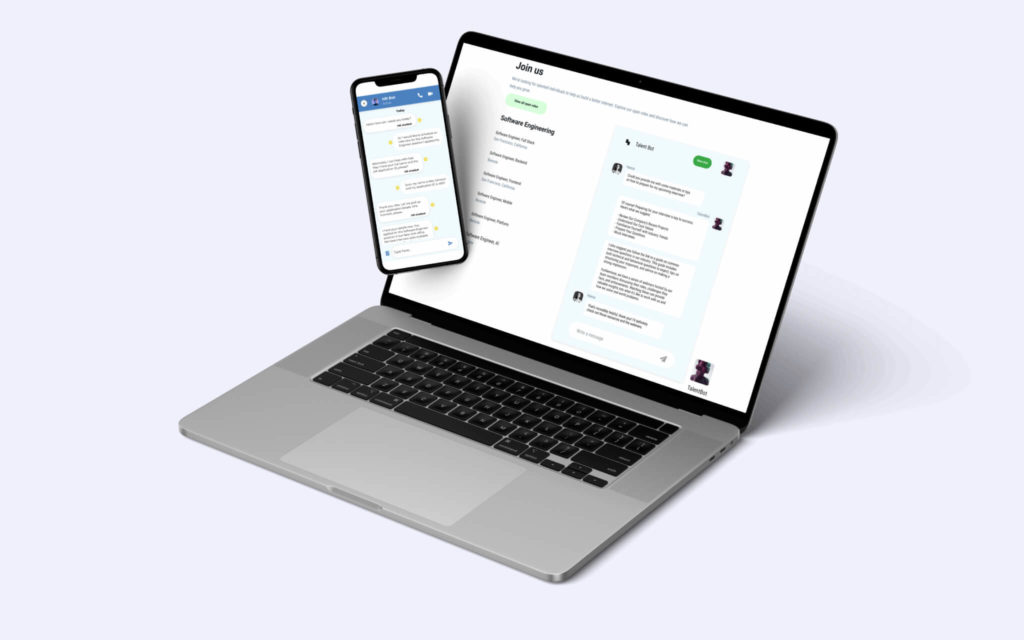
Employee wellbeing platforms – Implementing AI solutions in employee wellbeing platforms can help monitor employee wellness by analysing behavioural patterns, engagement, or productivity. These tools can help detect potential burnout or employee dissatisfaction at an early stage. Being proactive in this regard allows managers to introduce strategies to reduce stress and enables them to tackle problems before they escalate, thereby ensuring a healthier work environment.
Onboarding process – Artificial intelligence can make the onboarding process smoother and less stressful for a new employee. Innovative AI-based onboarding platforms can support the entire process by promptly providing information, sending reminders to fill out necessary documents and forms, or sharing critical company policies and scheduling relevant training sessions.
Talent development and training – The use of AI-based solutions can also apply to learning and development or talent training activities. In this case, such tools enable personalisation of the educational experience for each employee and for entire teams, thus allowing for consistent development or knowledge alignment. Additionally, AI can help analyse learning outcomes and methods, as well as adjust curricula or content to meet a company’s strategic or business needs.
Payroll and administration processing – Artificial intelligence has the potential to revolutionise the field of payroll and HR administration by automating tasks and minimising errors. AI tools can be used to streamline salary and tax calculations or automate manual procurement tasks while ensuring accuracy and regulatory compliance.
AI challenges and the role of legislation
Like many new and innovative technologies, artificial intelligence can also pose some challenges – starting with the need to reskill or redefine some of the roles of employees whose work can easily be replaced or altered by automation. Of course, AI solutions will not fully replace all workers, their knowledge, intuition, decision-making skills, or overall human touch. Nonetheless, some roles and jobs will need a mindset shift or require retraining, which will often involve support from employers in, e.g., developing talent reskilling plans or restructuring job roles.
Further challenges certainly include issues of ensuring the privacy of employee data and overall cybersecurity in the deployed AI solutions. With the increasing use of artificial intelligence to process and analyse information, data security is critical. HR departments need to assure employees that their personal data are secure and emphasise the importance of privacy aspects in AI systems’ data management strategy. Additionally, organisations need solid cybersecurity guidelines and tactics to instil employee confidence and prevent data breaches or potential hacking threats.
Some of the challenges described above will require adaptation to the new reality, but for others, the regulations put forward by various legislatures and international institutions will be fundamental. Notably, some of these legislations are already happening.
The European Union is currently in the process of developing the EU AI Act, which is anticipated to be the first comprehensive regulation of artificial intelligence applicable across various industries. Progress is well underway, as the draft has received provisional approval from relevant European institutions. This sets the stage for a potential swift adoption of the EU AI Act in 2024.
In early February 2024, the UK government also presented its approach to AI regulation. Unlike the EU proposal, this approach is based on established principles but is non-statutory. The adopted cross-sector and outcome-based framework for regulating AI draws on five core principles: safety, security and robustness; appropriate transparency and explainability; fairness; accountability and governance; and contestability and redress. However, it leaves regulators to interpret and apply them within their own competencies.
Benefits of using AI in HR
In an extensive and dynamic HR landscape, more and more companies are seeing the potential of using artificial intelligence solutions to streamline and elevate their operations. The implementation of AI-driven features brings various attractive benefits – it helps increase operational efficiency and facilitates strategic decision-making, therefore revolutionising the way organisations manage their human capital. Besides that, the most essential advantages that AI in HR offers include:
- Automation for increased efficiency – Using AI streamlines routine and repetitive administrative tasks, such as resume screening, initial candidate assessments, or matching candidates to job descriptions. Bringing automation into day-to-day work enables HR professionals to focus more on strategic initiatives and enhance HR operational efficiency.
- Data-driven decision-making – AI can provide actionable insights through data analysis, empowering HR teams to make informed choices related to talent acquisition, workforce planning, and employee development.
- Predictive analytics for talent engagement and retention – The predictive analytics capabilities of AI solutions help identify potential issues within the workforce, allowing HR professionals to proactively address concerns and enhance satisfaction, engagement, and overall talent retention.
- Personalised employee experience – AI-powered tools can facilitate the creation of bespoke learning and development programs, fostering a tailored employee experience that boosts motivation and satisfaction levels.
- Time and resource optimisation – By automating time-consuming tasks and activities, AI solutions can optimise many processes. AI-driven solutions allow HR professionals to reduce workload and allocate their resources more efficiently, and therefore contribute to overall productivity.
Over to you
By embracing AI solutions, the HR industry is not only modernising its operations but also paving the way for a future in which strategic, data-driven decision-making is critical to an organisation’s success. What’s more, the implementation of top AI functionalities and innovations can optimise various operations and build a greater competitive advantage in the business landscape. With all that in mind, the only thing left to do is to join other HR leaders in driving better results with innovative AI and HR tech solutions.
If you are interested in the capabilities of these solutions in HR tech or simply want to get ahead of the AI curve, contact us via the form below, and together, we will discuss the perfect AI solutions for your organisation.
About the author


